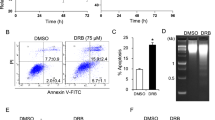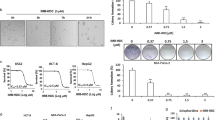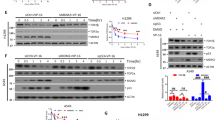Abstract
Poly (ADP-ribose) polymerase (PARP), a nuclear enzyme responsible for DNA strand breaks, has been recently suggested to be crucial for apoptosis induced by a number chemotherapeutic drugs. In this study, we demonstrated that the PARP activity could be evidently elevated with a peak at 6 h when HL-60 cells were treated with a new anticancer drug GL331. Coincident with the peak of PARP activity, an apparent DNA fragmentation and apoptotic morphology were observed in cells treated with GL331. The subsequent apoptotic DNA fragmentation induced by GL331 could be completely blocked by transfecting cells with anti-sense PARP retroviral vector or by treating cells with PARP inhibitor, 3-aminobenzamide (3-AB). This blocking effect thus suggests that activation of PARP was critically involved in GL331-induced apoptosis. The fact that Bcl-2 has been found to antagonize cell death induced by a wide variety of agents, accounts for why we examined whether if Bcl-2 could antagonize GL331 effects. Interestingly, ectopic overexpression of Bcl-2 in either HL-60 or U937 cells caused in resistance towards GL331-elicited DNA fragmentation and cytotoxic effect. Additionally, Bcl-2 also attenuated the poly(ADP-ribosyl)ation of PARP itself as well as Histone H1 at the early period of drug treatment. However, Bcl-2 did not influence the extent of DNA strand breaks induced by GL331 in either control or Bcl-2-overexpressing cells. In addition, analysis of basal PARP activity in control and several Bcl-2 overexpressing clones revealed that Bcl-2 down-regulated PARP activity under the condition without DNA damages. Above findings suggest that poly(ADP-ribosyl)ation of nuclear targets is important for apoptosis induced by DNA-reactive anticancer drugs.
This is a preview of subscription content, access via your institution
Access options
Subscribe to this journal
Receive 50 print issues and online access
$259.00 per year
only $5.18 per issue
Buy this article
- Purchase on Springer Link
- Instant access to full article PDF
Prices may be subject to local taxes which are calculated during checkout
Similar content being viewed by others
Author information
Authors and Affiliations
Rights and permissions
About this article
Cite this article
Kuo, ML., Shen, SC., Yang, CH. et al. Bcl-2 prevents topoisomerase II inhibitor GL331-induced apoptosis is mediated by down-regulation of poly(ADP-ribose)polymerase activity. Oncogene 17, 2225–2234 (1998). https://doi.org/10.1038/sj.onc.1202133
Received:
Revised:
Accepted:
Published:
Issue Date:
DOI: https://doi.org/10.1038/sj.onc.1202133
Keywords
This article is cited by
-
Induction of apoptosis by the inhibitors of poly(ADP-ribose)polymerase in HeLa cells
Molecular and Cellular Biochemistry (2009)
-
Cyclooxygenase-2 Overexpression in Human Basal Cell Carcinoma Cell Line Increases Antiapoptosis, Angiogenesis, and Tumorigenesis
Journal of Investigative Dermatology (2006)
-
Overexpression of interleukin-6 in human basal cell carcinoma cell lines increases anti-apoptotic activity and tumorigenic potency
Oncogene (2001)



